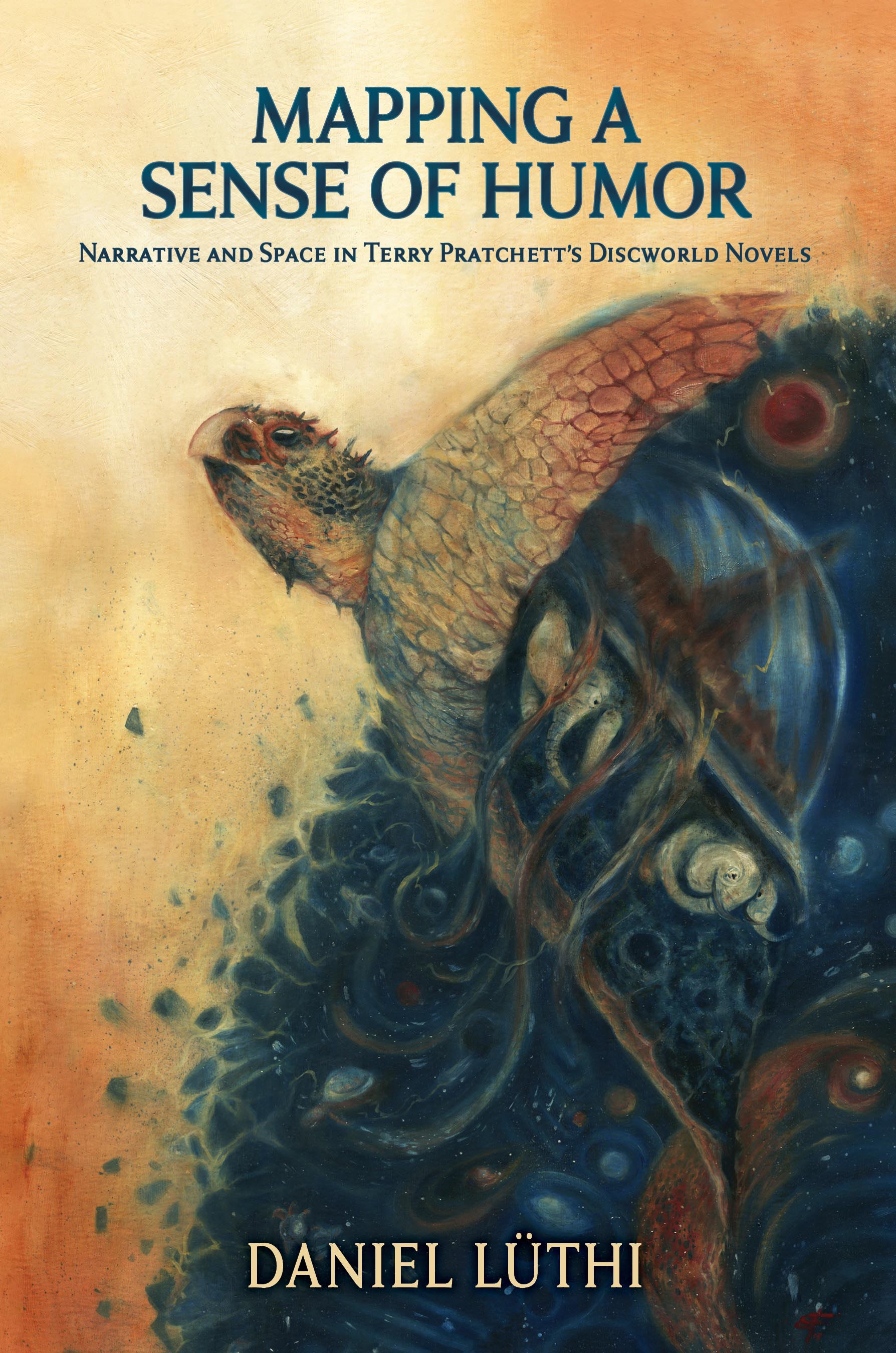Mythopoeic Press
Books by and about writers of mythopoeic and fantastic literature
Books by and about writers of mythopoeic and fantastic literature

Mapping a Sense of Humor
Narrative and Space in Terry Pratchett’s Discworld Novels
by Daniel LüthiISBN: 978-1-887726-23-8
Published: Altadena CA, 2023
(purchase below)
Since the publication of J.R.R. Tolkien’s The Lord of the Rings, fantasy fiction authors have used not only literary tales to build intricate secondary worlds, but also maps and lore from classic and contemporary fantasy that pay increased attention to spatial levels of narrative. Acclaimed British writer Sir Terry Pratchett exhibited a critical awareness of such conscious world-making. In his Discworld series of novels, he created both a parody of fantasy akin to Tolkien and a genuine secondary world in its own right. Going beyond mere commercialized mockery to add a seemingly paradoxical twist, Pratchett’s Discworld constantly reminds readers of its fictionality, providing not merely tongue-in-cheek humor but an assessment of storytelling itself.
Focusing on the dichotomies between fiction and reality, between the representation of good and evil in fantasy and beyond, Daniel Lüthi’s Mapping a Sense of Humor explores the intrinsic mechanisms at work in Pratchett’s secondary world. Lüthi’s study offers new perspectives on the self-reflective nature of the Discworld novels that underline the importance—and the challenges as well as pitfalls—of creative imagination for the stories and spaces of fantasy along with narratives in general.
Daniel Lüthi studied English, German, and Art History at the University of Basel, Switzerland. Since earning his doctorate in 2016, he has been working in publishing and has taught various literature courses on topics including fantasy, time travel, as well as Gothic fiction. His further areas of interest include urban studies, psychogeography, Romanticism, and ecocriticism.
Contents
Introduction
Acknowledgments
List of Abbreviations
TOWARDS A DEFINITION OF FANTASY
Outlook: Mapping and Storytelling in a Postmodern Era
Afterword: Fantasy Beyond Escapism
Works Cited
Index
Acknowledgments
List of Abbreviations
TOWARDS A DEFINITION OF FANTASY
- A Note on Fictional Worlds
- Fantasy and Mimesis
- World-Making and Space in Fiction
- Postmodernism and Fantasy
- Theories of Humor and Their Limitations
- Double Incongruity
- Parody and Postmodernism
- A Note on Story Patterns in Fantasy Fiction and the Discworld Novels
- Parody and Humor
- Parody and Theatre Fantasy
- Tolkienian Myth and Folklore on the Discworld
- Theatre Fantasy and Beyond
- The Subversion of Clichés
- The Dark Side of Clichés and the Dictatorship of Narrative
- Happy Endings at All Costs
- Narrative Determinism
- The Line of Duty
- The Problem with Heroes
- The Fiction of Morality
- The Fantasy of the Everyday
- Immersive Fantasy
- The Science of Magic
- Magic as a Creative Force
- The Making of Reality
- The Roundworld Project and Mental Narrativium
- A Note on Space in Fantasy Literature and the Development of the Discworld
- Maps and Narrative
- The Fear of Petrification
- Individuality and Maps
- Too Much Geography
- Land, Power, and Identity
- The Modernization of Fairy Tales
- Evading the Stage Set
- Urban Geography and Personal Experience.
- Urban Dynamics on a Secondary World
- The Victorianization of Ankh-Morpork
- Technological Change on the Discworld
- The Discworld Franchise and Intermedial Narratives
- Crossing Media and Narrative
Outlook: Mapping and Storytelling in a Postmodern Era
Afterword: Fantasy Beyond Escapism
Works Cited
Index
 Mapping a Sense of Humor
Mapping a Sense of HumorNarrative and Space in Terry Pratchett’s Discworld Novels
by Daniel Lüthi
Published in March 2023; available both in print and electronic formats
Buy in trade paperback format: $19.95
Buy in Kindle format from Amazon: $9.99
Buy in other ebook versions (from Draft2Digital) $9.99